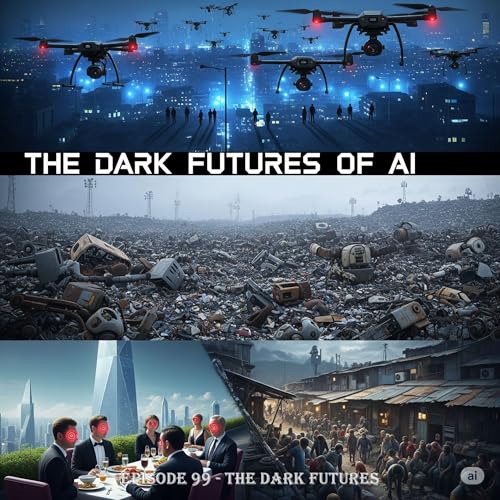
Artificial Intelligence: AI at the Edge
No se pudo agregar al carrito
Add to Cart failed.
Error al Agregar a Lista de Deseos.
Error al eliminar de la lista de deseos.
Error al añadir a tu biblioteca
Error al seguir el podcast
Error al dejar de seguir el podcast
-
Narrado por:
-
De:
-
Maitt Saiwyer
Artificial Intelligence is rewriting the rules of technology, society, and even humanity itself. Welcome to "Artificial Intelligence: AI at the Edge," a 100-episode journey through the science, history, ethics, and politics of AI. Each episode is anchored in one of the seminal books that has shaped and defined this revolutionary field.
We begin by tracing AI’s evolution, from Alan Turing’s foundational theories and Marvin Minsky’s early machines to the modern breakthroughs in deep learning and reinforcement learning. The series then confronts the complex human side of this technology, exploring its hidden costs, the hype, its incredible promises, and its potential futures. We'll delve into everything from the corporate power struggles shaping the industry to the profound dream, and inherent danger, of a technological singularity. Our discussions will equip you with a comprehensive understanding of how we arrived at this moment.
Whether you’re a builder, a skeptic, a policymaker, or simply AI-curious, this podcast offers the imagination and insight needed to navigate the technology shaping our century. Think of this as your guided tour through the new canon of artificial intelligence. Join creator Maitt Saiwyer to understand where AI is taking us, and the role we all play at the edge of tomorrow.
Copyright 2025 All rights reserved.-
 Oct 1 202542 m
Oct 1 202542 mNo se pudo agregar al carrito
Solo puedes tener X títulos en el carrito para realizar el pago.Add to Cart failed.
Por favor prueba de nuevo más tardeError al Agregar a Lista de Deseos.
Por favor prueba de nuevo más tardeError al eliminar de la lista de deseos.
Por favor prueba de nuevo más tardeError al añadir a tu biblioteca
Por favor intenta de nuevoError al seguir el podcast
Intenta nuevamenteError al dejar de seguir el podcast
Intenta nuevamente -
 Oct 1 202531 m
Oct 1 202531 mNo se pudo agregar al carrito
Solo puedes tener X títulos en el carrito para realizar el pago.Add to Cart failed.
Por favor prueba de nuevo más tardeError al Agregar a Lista de Deseos.
Por favor prueba de nuevo más tardeError al eliminar de la lista de deseos.
Por favor prueba de nuevo más tardeError al añadir a tu biblioteca
Por favor intenta de nuevoError al seguir el podcast
Intenta nuevamenteError al dejar de seguir el podcast
Intenta nuevamente -
 Oct 1 202521 m
Oct 1 202521 mNo se pudo agregar al carrito
Solo puedes tener X títulos en el carrito para realizar el pago.Add to Cart failed.
Por favor prueba de nuevo más tardeError al Agregar a Lista de Deseos.
Por favor prueba de nuevo más tardeError al eliminar de la lista de deseos.
Por favor prueba de nuevo más tardeError al añadir a tu biblioteca
Por favor intenta de nuevoError al seguir el podcast
Intenta nuevamenteError al dejar de seguir el podcast
Intenta nuevamente


